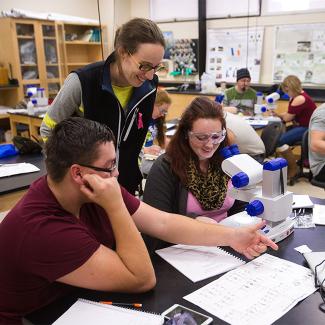What you'll learn studying Osteopathic Medicine at UW-Platteville
Osteopathic medicine is one of two medical fields fully licensed and approved for the delivery of complete medical care. Osteopathic physicians practice in all recognized medical specialties, using the full range of healthcare techniques in diagnosis and treatment. The distinctive feature of osteopathic medicine is the recognition of the interrelationship between the structure and function of the body, that is, traditional emphasis on holistic medicine or treating the patient as a whole person.
One of the characteristic features and added dimensions of an osteopathic physician in terms of clinical practice is the utilization of manipulative therapy. As these healthcare techniques grow in popularity, the projected growth in employment of physicians and surgeons in this field is expected to grow 13%.*
Our Pre-Osteopathy program provides a basic body of knowledge to meet the admission requirements for osteopathic schools. Admission to an osteopathic school follows the completion of a bachelor’s degree.
*According to the Bureau of Labor Statistics, these projected growth rates are from 2016–26.
Careers in Osteopathic Medicine
Studying pre-osteopathy as an undergraduate and then furthering your education at an osteopathic school will prepare you to work in a clinical setting as an osteopathic physician. Medical practitioners who choose this career often do so because of a desire to treat patients holistically, which may include hands-on therapies as well as traditional medical treatments. However, there are also several non-clinical roles you could choose to pursue in this field.
- Clinical professor
- Diagnostic medical specialist
- Family medicine doctor
- Family practice director
- Internal medicine specialist
- Intervention radiologist
- OBGYN doctor
- Osteopathic physician
- Pediatrician
- Primary care physician
- Regenerative medicine specialist
- Rehabilitation physician
- Surgeon
Working as an osteopathic physician can be incredibly rewarding, as you are able to help people as individuals and see first-hand the results of prescribed treatments. Studying pre-osteopathy is the first educational step in your career. In addition to attending an osteopathic school, you will need to complete a residency where you’ll work in a clinic or hospital setting under the supervision of an attending physician. You will also need to meet state licensure requirements and may wish to obtain board certification.

More than Memorization
Students studying pre-osteopathy at UW-Platteville learn in a variety of ways. In addition to knowledge gained through classroom lectures, you can also complete research projects, internships, and attend university events designed to supplement and enhance your education.


